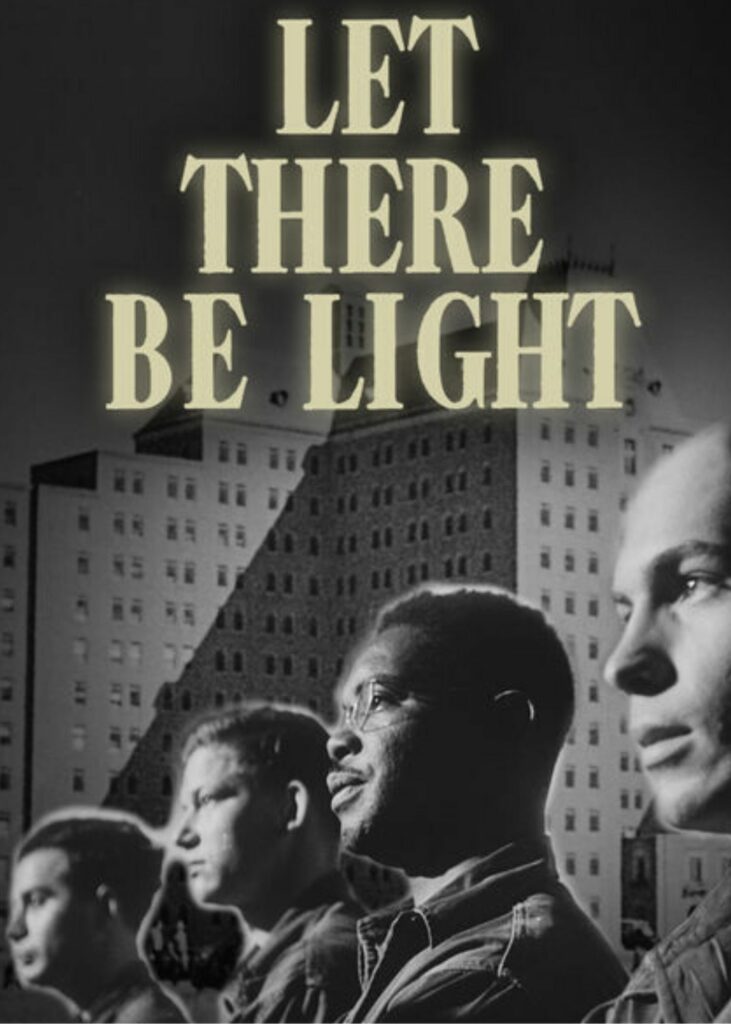“On Background” is a series of blog posts wherein I talk about the books, films, and other media that would come to inform me in writing WE TAKE CARE OF OUR OWN. My gratitude to the authors, journalists, filmmakers, and thinkers responsible for these works is hereby assumed.
Let There Be Light is a 1946 documentary directed by the great John Huston about the treatment of U.S. Army soldiers’ post-traumatic stress disorder, or “shell shock” as it was more commonly known back then, in the years after World War II.
I first learned about Let There Be Light in 2012, from a blog post on The New Republic website. “Think about setting aside 58 minutes today to watch Huston’s extraordinary film,” the writer says, linking to a page on the National Film Preservation Foundation’s website where you could download the film for free. (Hey, looks like you still can!)
Let There Be Light was instrumental in my thinking about the approach that The U.S. Armed Forces takes toward PTSD and related mental health disorders among servicemen (anxiety, depression, bipolar, alcoholism), and it helped me get a little more comfortable writing about something with which I had zero firsthand experience.
That said, I think the relationship of research to fiction is a strange one. Research is fine as far as it goes, but I don’t think it should ever alter one’s connection with or desire to write a story. A writer can very easily research themselves out of a story, often after coming to one of two conclusions:
- The subject you’d like to write about is inexhaustible, and therefore unknowable, and who the fuck are you to think you can say anything definitive about it?
- Somebody already wrote something quite similar to the story you were wanting to write, and therefore what’s the point, oh well, better luck next time.

Another pitfall of research for fiction is that you get so “in the weeds” with the research stuff that your story becomes less a vibrant work of the imagination—you know, fiction—and more a long encyclopedia entry, plus characters. I am thinking specifically here of The Alienist by Caleb Carr. Yes, it was a national bestseller, and it made Carr a pretty hot author for a few years there in the mid- to late 1990s, but I found the novel bloodless (in the “without emotion” sense of the word) and hard to wade through. All that stuff about New York City prostitution circa 1919 bogged down the storytelling proceedings. This is my opinion, merely.
Anyway, Let There Be Light: What I most remember is the African American soldier who can’t stop crying, due to what he describes as “nostalgia.” Weird word choice, I thought at the time, though of course when one cannot explain one’s tears, language becomes useless, rendering one’s word choice inconsequential.
Me, when I hear the word nostalgia I think of a mostly pleasant emotion, one charged with wistfulness or poignancy, signaling a spiritual return to the cozy past, when love could be felt more closely. No one feels nostalgia for time spent at the Department of Motor Vehicles. In that sense, nostalgia can be downright intoxicating, an escape from a more painful or lonely present.
Sure, OK, maybe nostalgia for home or family or whatever can result in one or two quiet tears, especially when you’re on the front line, but what this young man was dealing was far more debilitating. The film shows him literally unable to explain the reasons for his ungovernable crying jags without crying. It’s excruciating to watch, and the emotions that run across his face—embarrassment, helplessness, doubt, fear, nostalgia—made such an impression on me that probably not a month goes by wherein I don’t wonder if that soldier ever got over it. Let There Be Light gives the impression that he’s well on his way to licking the problem, but we’re talking about a period in American history when psychology was widely touted as a kind of quick fix savior of humanity. Kind of like how technology is touted today.
And so my novel, We Take Care of Our Own (available from Montag Press in 2020, God willing), features a young soldier undergoing therapy for what has been diagnosed as PTSD, and at one point labeling his feelings “nostalgia.” If you happen to come across it and think, Hey, weird word choice, well, nothing would delight me more.